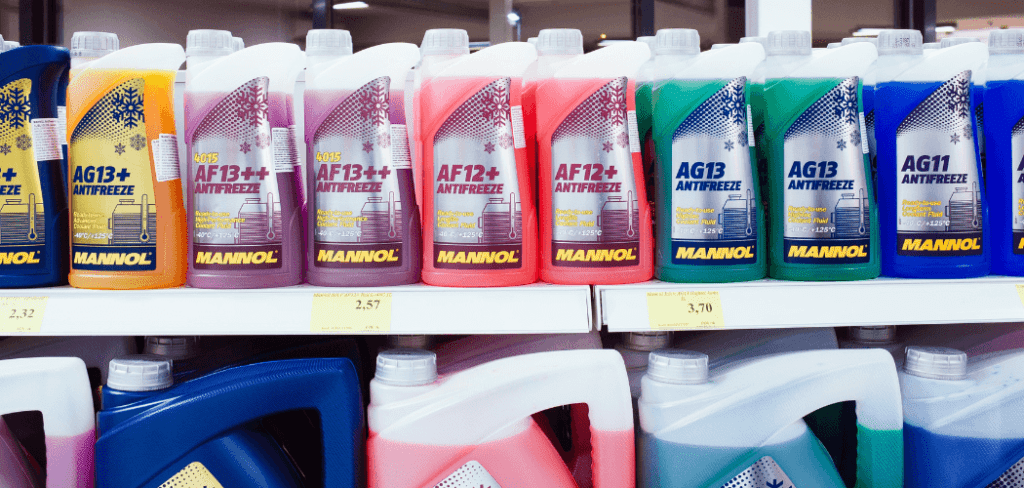As the weather starts to turn cold and winter approaches, outdoor enthusiasts with RVs face the challenge of winterizing their vehicles. One of the essential components of this process is the use of RV antifreeze, which protects the RV’s plumbing system from freezing and potentially bursting during the winter months.
If you’re an outdoor enthusiast who owns an RV, it’s important to understand how RV antifreeze works, how to store it properly, and how to tell when it needs to be replaced. By taking the necessary steps to maintain your RV antifreeze, you can ensure that your plumbing system remains protected throughout the winter months.
Below, we’ll take a closer look at RV antifreeze, how it degrades over time, and how to properly store it to maintain its effectiveness. We’ll also discuss how to tell when your RV antifreeze needs to be replaced and provide some tips for ensuring that your RV is properly winterized. So, let’s get started!
What is RV Antifreeze?
RV antifreeze, also known as recreational vehicle antifreeze or non-toxic antifreeze, is a type of antifreeze specifically formulated for use in the potable water system of an RV. Unlike traditional automotive antifreeze, which is toxic and should not be used in an RV’s plumbing system, RV antifreeze is safe for use.
These solutions are typically made from propylene glycol, which is less toxic than the ethylene glycol found in automotive antifreeze. Propylene glycol has a lower freezing point than water, which means that it can be used to protect an RV’s plumbing system from freezing during the winter months.
RV antifreeze is available in different colors, including pink and blue, to help distinguish it from other types of antifreeze. It is also available in different strengths, typically labeled as -50°F, -100°F, or -200°F, depending on the temperature rating.
When preparing your RV for winter storage, it’s important to use the correct type of RV antifreeze for your particular vehicle. Be sure to consult your RV’s owner’s manual or speak with a professional to ensure that you’re using the right type and amount of antifreeze.
Does RV Antifreeze Degrade Over Time?
If you’re an outdoor enthusiast who owns an RV, it’s important to understand that RV antifreeze can degrade over time. This degradation can occur due to a variety of factors, including exposure to sunlight, high temperatures, and air.
Over time, RV antifreeze can become less effective at protecting your RV’s plumbing system from freezing. This can lead to potentially costly repairs, so it’s important to be aware of the signs that your RV antifreeze may need to be replaced.
One of the primary signs that your RV antifreeze may be degrading is a change in color. RV antifreeze is typically pink or blue when it is new. However, over time, it can become yellow or brown in color. This is a sign that the antifreeze is breaking down and may not be as effective at protecting your RV’s plumbing system.
Another sign that your RV antifreeze may be degrading is a change in consistency. If the antifreeze becomes thicker or more viscous over time, it may be breaking down and losing its effectiveness. In some cases, the antifreeze may even start to form crystals or solidify, which can cause blockages in your RV’s plumbing system.
To ensure that your RV antifreeze remains effective, it’s important to store it properly. RV antifreeze should be stored in a cool, dry place, away from direct sunlight and high temperatures. It’s also a good idea to store the antifreeze in its original container, as this can help to prevent air exposure and contamination.
Let’s take a closer look at how to properly store RV antifreeze.
How to Store RV Antifreeze Properly?
Proper storage of RV antifreeze is crucial to maintaining its effectiveness and preventing degradation over time. Here are some tips for storing your RV antifreeze properly:
1. Choose the right container
RV antifreeze should always be stored in a container that is designed for antifreeze. Make sure that the container is clean and free of any contaminants before pouring in the antifreeze.
2. Store in a cool, dry place
RV antifreeze should be stored in a cool, dry place, away from direct sunlight and high temperatures. This can help to prevent degradation and ensure that the antifreeze remains effective.
3. Keep the container sealed
Once you’ve opened the container of RV antifreeze, make sure to keep it tightly sealed when not in use. This can help to prevent air exposure and contamination.
4. Avoid exposure to air
RV antifreeze can degrade over time when exposed to air. To prevent this, it’s important to minimize air exposure by pouring the antifreeze into smaller containers if necessary and keeping the containers sealed when not in use.
5. Label the container
Be sure to label the container with the type and strength of RV antifreeze inside, as well as the date it was purchased or opened. This can help you keep track of when the antifreeze needs to be replaced.
By following these tips, you can ensure that your RV antifreeze remains effective and protects your RV’s plumbing system from freezing. If you’re unsure about how to properly store your RV antifreeze, be sure to consult your RV’s owner’s manual or speak with a professional for guidance.
Signs of Degraded RV Antifreeze

If you’re wondering whether your RV antifreeze has degraded over time, there are a few signs to look out for:
1. Change in color
RV antifreeze is typically bright pink or green in color. If you notice that the color has changed to a darker or more opaque shade, it could be a sign that the antifreeze has degraded.
2. Unusual smell
RV antifreeze usually has a distinct odor. If you notice that the antifreeze smells different than it did when you first purchased it, it could be a sign that it has degraded.
3. Change in consistency
RV antifreeze should have a consistent texture and thickness. If you notice that the antifreeze has become thinner or thicker than it was when you first purchased it, it could be a sign that it has degraded.
4. Contaminants
If you notice any debris or contaminants in the RV antifreeze, it could be a sign that it has degraded or become contaminated over time.
If you notice any of these signs, it’s important to replace the RV antifreeze as soon as possible. Degraded RV antifreeze may not provide adequate protection against freezing temperatures and could lead to damage to your RV’s plumbing system.
Related: RV Antifreeze and Mold: Does RV Antifreeze Get Moldy?
When to Replace RV Antifreeze?
Knowing when to replace your RV antifreeze is crucial to ensuring the proper protection of your RV’s plumbing system. While it may be tempting to simply leave the antifreeze in your RV’s plumbing system year-round, it’s important to replace it periodically to ensure it hasn’t degraded over time.
So, when is the best time to replace your RV antifreeze? There are a few factors to consider:
1. Frequency of use
If you use your RV frequently throughout the year, you may want to replace the antifreeze every six months to ensure that it hasn’t degraded over time.
2. Climate
If you live in an area with particularly harsh winters or experience extreme temperature fluctuations, you may want to replace the antifreeze more frequently to ensure that it provides adequate protection against freezing temperatures.
3. Age of the antifreeze
Even if you haven’t used your RV in a while, it’s important to periodically check the age of the antifreeze. Most RV antifreeze is rated to last between 1-5 years, so if it’s been sitting in your RV’s plumbing system for longer than that, it’s time to replace it.
4. Signs of degradation
As we discussed earlier, if you notice any signs of degradation in your RV antifreeze, such as a change in color, smell, consistency, or the presence of contaminants, it’s important to replace it as soon as possible.
Conclusion
Yes, RV antifreeze can degrade over time due to exposure to air, moisture, and sunlight, which can cause it to become less effective at preventing freezing and potentially causing damage to your RV’s plumbing system. It’s important to store RV antifreeze properly and replace it periodically to ensure it remains effective.
By following the tips outlined in this article, you can ensure that your RV antifreeze remains effective and provides the protection your RV needs.
Also remember to check the manufacturer’s recommendations for storing and replacing your RV antifreeze, as well as to be on the lookout for any signs of degradation, such as changes in color, consistency, or smell.
